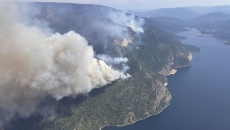A large majority of Canadians are worried about climate change and believe it is the reason for an increase in extreme weather, a new national poll suggests.
But the Leger poll says only a small fraction of people listed climate change as the top issue facing Canada today, and many say they're only likely to change their behaviour if that doesn't come with a cost.
The polling firm asked more than 1,500 people about their views on climate change in an online survey conducted between Sept. 8 and 10.
The poll, which is weighted to account for demographic differences, can't be assigned a margin of error because online surveys are not considered truly random samples.
It comes at the end of Canada's worst wildfire season in history.
Globally, temperatures hit record highs in July, while Canadians in every province and much of the North were directly impacted by fires — if not from the blazes directly, then by the thick smoke from those fires that blanketed cities and towns thousands of kilometres away.
More than 100,000 people were forced to evacuate their homes between May and September and hundreds of homes burned, including about 200 in suburban Halifax in the spring, and almost as many in West Kelowna, B.C., in August.
Against that backdrop, 72 per cent of Canadians surveyed said they are worried or very worried about climate change and 21 per cent said they were not very worried. Only seven per cent said they weren't worried about it at all.
Respondents from Quebec were most likely to be worried or very worried, at 84 per cent, while Albertans were the least likely to be worried, at 55 per cent.
Younger Canadians are more concerned about the climate than older Canadians, and women are more worried than men.
Pocketbook issues heavily outweighed climate change as a top-of-mind issue for Canadians in the poll, with only seven per cent of those surveyed listing climate change as the top issue facing the country.
The largest share — 33 per cent — said inflation is the top issue, 16 per cent chose housing affordability, and eight per cent pointed to rising interest rates.
Sixty-nine per cent of those surveyed said climate change is caused by human activity, while 21 per cent said they believe it's just part of a natural pattern. More than 80 per cent of Quebec residents polled blame people for climate change, compared with 51 per cent in Alberta.
Almost three quarters of Canadians surveyed think extreme weather events are linked to climate change, and about two in three think we're going to see more extreme weather in the future.
Sixty-one per cent of respondents said they have already changed some of their daily behaviour because of their concerns about climate change and 68 per cent said they planned to make changes to their daily life in the next five years.
However, only 40 per cent said they'd make changes to their daily lives if that comes with a cost.
Environmental activists have long argued Canadians need to be thinking not just about how much it costs to change our behaviour to slow climate change, but also how much it costs not to act.
Last spring, the federal government issued an updated analysis showing it costs Canada $261 this year for every tonne of greenhouse gas emissions emitted. Those costs include the impact of extreme weather on things like food production, human health and disaster-repair bills. The analysis suggested that by 2030, that cost will rise to $294 per tonne.
The most recent inventory showed Canada emitted about 670 million tonnes in 2021. The current target aims to reduce that by more than 230 million tonnes a year by 2030.






